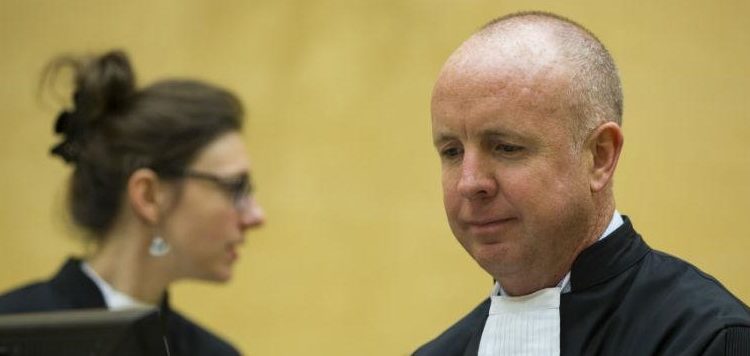Fergal Gaynor, represented victims during President Uhuru’s case at The Hague.
Extensive bribery and intimidation of witnesses, covered by diplomatic defenses for these activities undermined the victims quests for justice, lawyer Fergal Gaynor said during an interview after the decision on using of recanted evidence in Kenya’s Deputy President William Ruto and former journalist Joshua Sang.
Mr Gaynor, who was the Common Legal Representative for over 2000 victims in the ICC case against Uhuru Kenyatta, further said state obstruction of access to documentary evidence had further hobbled trials at the ICC. Kenyatta’s case was dropped at the end of 2014 for lack of evidence. Prosecutor Fatou Bensouda complained that her key witnesses had been killed, disappeared or been improperly influenced through bribery and intimidation.
“The Trial Chamber applied the rule retroactively to the detriment of the accused,” read the ruling by Presiding Judge Piotr Hofmanski adding that the prior recorded testimony was delivered without an opportunity for the accused to cross-examine the witnesses.
Lawyer Gaynor now says that applying Rule 68 was a much-needed response to a number of factors, including the problem of a witness who gives an initial statement and who then, following bribery or intimidation, recants core parts of the account.
Since Rule 68 was amended in November 2013 at the Assembly of State Parties in The Hague, Netherlands, Gaynor says the Kenyan government has poured enormous diplomatic resources into opposing its application.
“This diplomatic campaign has been packaged as an assault on neo-colonialsm and racism but its core objective is undoubtedly to bring to an end the case against Ruto,” he told JFJustice.
The Kenyan government, he adds, has yet to explain why it has been so energetic in its efforts to protect the fetid results of a large, coordinated criminal effort to influence witnesses through a mixture of intimidation and bribery.
The anti-Rule 68 diplomatic campaign was conducted by the Kenyan government through diplomatic moves at the African Union, the UN, and the ASP, and in legal filings before Chambers of the ICC.
Gaynor says the campaign was accompanied by other alarming events which appear to be aimed at silencing those familiar with the campaign to interfere with ICC witnesses, in particular the murder of Meshak Yebei, and the Kenyan government’s failure to arrest those responsible for that murder.
Further, the ICC’s efforts to secure the transfer to The Hague of any of the three persons publicly charged by the ICC with interference with Kenyan witnesses have so far been unsuccessful. These include journalist Walter Barasa, Paul Gicheru and Philip Bett.
“The campaign of intimidation and bribery of witnesses, and the state campaign to ensure that the results of that interference were protected, took place in parallel with a campaign of state obstruction of access to documentary evidence relevant to determining who was most responsible for the crimes committed against tens of thousands of Kenyans during the PEV.”
The lawyer faulted the Kenyatta government’s unwillingness to provide the court with critically significant financial and cell phone evidence relevant to the involvement of Kenyatta in the Post-Election Violence.
“The Court requested that evidence almost four years ago, in April 2012. Its request remains outstanding,” Gaynor adds that the Kenyan government has deliberately and unlawfully withheld that evidence from the Court.
“All of this has of course taken place in tandem with the Jubilee government’s decision not to deliver any domestic accountability mechanism whatsoever in Kenya.”
In the Ruto and Sang case, Trial Chamber V (a) allowed their defense counsels to appeal a decision that had allowed the prosecutor to use prior recorded statements of five of her witnesses who had recanted their evidence. She argued her case would weaken without the significant incriminating evidence of the witnesses in question.







